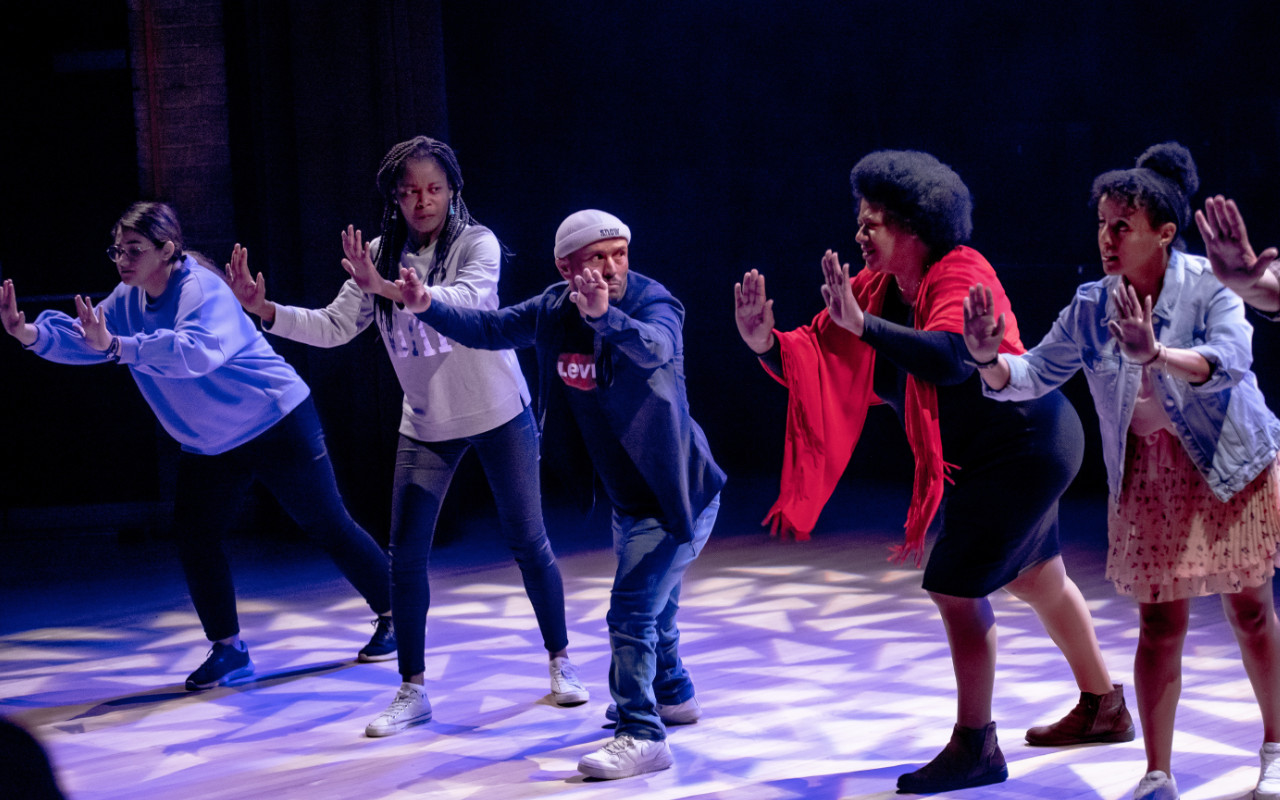
Curious Monkey's Arriving Group performing at Refugee Week 2021
Photo: picturesbybish
Theatre of sanctuary
For Amy Golding, creating a new play starts with an encounter that sparks inspiration, followed by working with a community invited to share the journey.
For anyone seeking sanctuary in this country, the Nationality and Borders Bill currently going through the House of Lords is very worrying. The Bill, if passed, will criminalise and punish people who arrive here through the ‘wrong’ routes, often after long and treacherous journeys.
They may be sent to offshore detention (an inhumane and very expensive solution), turned back in the English Channel, or deported to countries that pose immediate danger.
The Bill characterises refugees as a problem group rather than individual people needing support. Being a refugee is a situation, it is not an identity. And rather than being part of a homogeneous group, every refugee’s story and journey is unique, and deserving of compassion and humanity.
I have spent the last four years meeting people who have come to the UK seeking sanctuary. It has been transformational for the company I lead – Curious Monkey – which became a Theatre Company of Sanctuary in 2019.
People are not hard to reach
Our latest production, HERE, was sparked by two things: a meeting with a young man from Afghanistan who’d arrived alone and ended up in a children’s home in Newcastle; and The Other Side of Truth, a novel by Beverley Naidoo about a brother and sister fleeing Nigeria for London after the murder of their mother.
Exploring the experience of arriving alone in a UK city was the starting point. Seen through the eyes and ears of a young person who doesn’t speak the language or know the culture, how does a city appear? Is it welcoming? What places feel safe, where can friendship and trust be found?
At Curious Monkey, we work with people who have lived experience of our project. In participatory arts, we have learned that people are not hard to reach; rather organisations and buildings are hard to access. Encouraging trust and a frame of reference for ‘what happens in there’ is necessary to get people to come in.
Fictional but authentic
Joana Geronimo, an associate artist with the company, is from Angola and was a young refugee in the UK herself. Together, we spent time at refugee centres and quickly learned that people had far more urgent concerns than making a play – such as navigating the complex asylum system, preparing for Home Office interviews, learning English, managing trauma and mental health, housing and financial struggles. Things we mostly couldn’t help with.
What we could offer was a visit to the theatre to forget worries, have fun, meet people, eat food together, experience some culture and begin to build a frame of reference. This would be useful for our later conversations about the play we wanted to make.
We did this for about six months before workshops began, seeing a variety of genres from dance to new writing. We talked a lot about theatre and culture, we learned new vocabulary together and we made friends.
Lindsay Rodden, our writer, came too to soak up the rich conversations. We never asked anyone directly for their story of what led them to leave their country. People in the asylum system are already asked to recount them numerous times in detail as evidence and proof of status. So, HERE and its characters are fictional but authentic.
The Arriving Group
Over time we formed The Arriving Group, a big family from all over the world now living in North East England. We have been meeting weekly for four years. Together we create art, learn new skills and practise language. We celebrate our achievements, support each other in difficulties, and welcome new arrivals.
Many are now making their own creative work, some volunteering with Curious Monkey, others shadowing artists to develop skills in specific areas such as sound design, stage management or vocal training.
The play was our initial joint focus and the group was involved in all drafts of the script as well as in visiting the rehearsal room. But the people and the journey in the end became more important than the play.
The project snowballed and determined a new direction for the company. Becoming a Theatre Company of Sanctuary saw us make a commitment to continue welcoming and creating with people fleeing persecution and war, seeking safety here.
Co-creation requires time
HERE finally reaches the stage next month after a two year postponement with a cast including actors from Angola, Albania, Kurdistan and a Glaswegian Geordie. Casting actors with lived experience of being refugees has been crucial to do justice to our characters and those who helped to develop them.
And the inspiration for our next show Penguin has emerged from this. Penguin is a personal story from Arriving Group member Hamzeh. After four years getting to know us, he now wants to share the story of his life in Syria, Jordan and Gateshead.
Co-creating with community takes time, to build the trust and a frame of reference before really starting the work. But this last four years has clearly demonstrated that working slowly, in depth and with care allows you to work ethically and to be open to work evolving in unexpected ways. It definitely brings the best results.
Amy Golding is Artistic Director at Curious Monkey and Director of HERE by Lindsay Rodden.
![]() curiousmonkeytheatre.com
curiousmonkeytheatre.com
![]() @curiousmonkey_ | @GoldingAmy
@curiousmonkey_ | @GoldingAmy
HERE has been co-produced with Northern Stage and Newcastle University. It runs from 4-12 March at Northern Stage in Newcastle and will be streamed online. All performances are relaxed, there are BSL and captioned performances and synopses are available in several languages.
Join the Discussion
You must be logged in to post a comment.